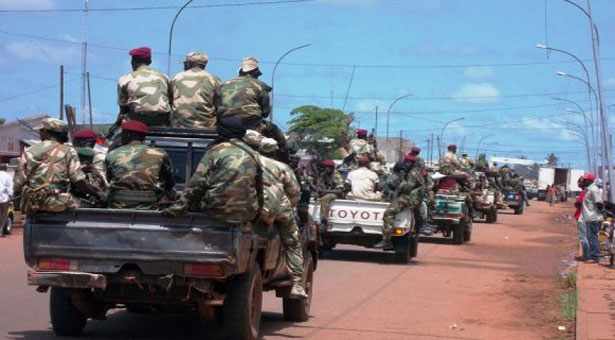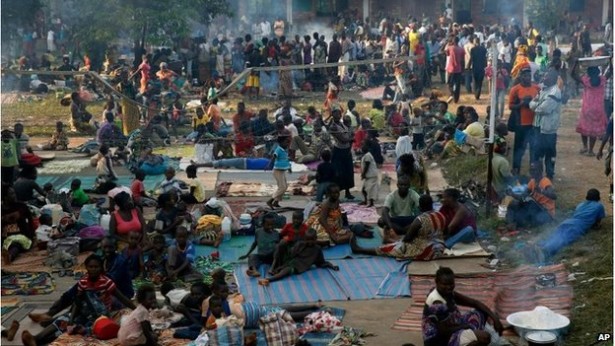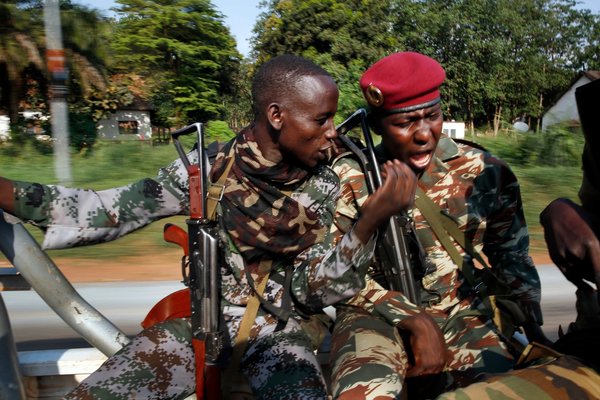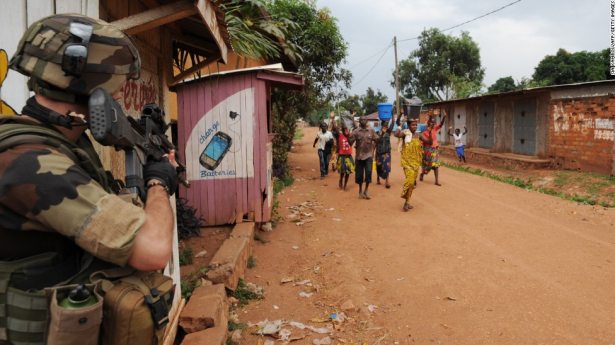
If you’ve flipped/clicked through a newspaper, scrolled through your Twitter feed, or turned on any news channel in the last few days, you’ve undoubtedly been bombarded with headlines about the Central African Republic (CAR). Unrest, which began when the rebel group Seleka (now referred to as ex-Seleka to reflect the group’s splintering over the past several months) overthrew the CAR government this last March, has now reached such catastrophic levels of devastation that the international community has awoken to the grave humanitarian crises that has been unfolding for the past nine months. And as if trying to fast track the recap of this years developments (and in some sense the historical context leading up to the coup), international media outlets have been slapping labels on outpouring reports to try to make sense of the terrible violence that has largely targeted innocent civilians: ‘Religious Violence’, ‘Resource Conflict’, ‘Political Turmoil’.
Then, more recently—and likely contributing to the recent explosion in media attention— the atom bomb of humanitarian descriptives was dropped: Genocide. While no one has called it genocide outright, many reports are now describing the country as “On the Verge of Genocide”, or CAR’s “Coming Genocide”. Genocide is defined as “intent to destroy, in whole or in part, a national, ethnical, racial or religious group” by means of physical, mental and/or structural violence; and although the level of violence is nearly unfathomable, the indiscriminate, unorganized, widespread and even intra-secretarial killing suggests that, at least at this point, this is less of a genocide than it is anarchic bloodshed perpetuated by indefinite groups of armed criminals. Nonetheless, that researchers and writers are employing the term, even if for advocacy, illustrates the need for critical and urgent action. Even President Obama has come forward to make a direct appeal to the people of CAR, urging them to lay down their weapons.

Thousands have been displaced by the violence (Photo credit: BBC News)
To back up, Seleka, meaning “alliance” in the national language of Sango, was an insurgency formed primarily of smaller rebel groups that originated in the northeast corner of the country sharing fluid borders with Sudan and Chad; in fact, by some estimations three out of four Seleka were from one of these two neighboring countries. This isolated region was historically marginalized by the CAR government and “in recent years the country has been virtually ungoverned” by former president François Bozizé and his administration.
For various grievances, including dissatisfaction with Bozizé’s failed governance, these armed rebel groups from northeast CAR and larger the tri-border areas converged to overthrow the central government. With differing motivations and prior tensions, internal factions that existed within Seleka before the coup continued to escalate after Michel Djotodia, the now sitting leader CAR’s transitional government, usurped power. CAR, which has a historically weak and neglectful government, lost all semblance of an organized state with the installation of Seleka. The rebel group began to fracture, mercenaries hired to help overthrow Bozizé went unpaid, and in turn began looting and killing, and the abuse perpetrated by the primarily Islamic ex-Seleka has provoked Christian vs. Muslim violence. This religious tension is a central component of the acute warfare now responsible for the death and displacement of thousands. Christian ‘self-defense’ groups called anti-balaka (meaning ‘anti-machete’, the weapon commonly used by ex-Seleka forces) have been countering aggressive elements of ex-Seleka that are reportedly going door-to-door killing civilians.

Ex-Seleka soldiers patrol in Bangui following a daylong battle with Christian militias. (Photo credit: AP Photo/Jerome Delay)
France has recently deployed another 1,600 troops to its former colony to join the 3,600 strong MISCA force (the AU military mission in CAR). The UN, which has already installed several thousand security forces, is discussing the addition of up to 9,000 additional peacekeepers, although the capacity of the UN to act urgently and effectively on this matter may prove challenging. The international community is holding conferences, conventions and hearings on ‘what to do about CAR’. Everyday that passes the situation deteriorates further.
And this mass violence doesn’t include the tens of thousands that have been victims to the LRA in the southeast corner of CAR.
Although the LRA conflict (for now) remains geographically disconnected from the widespread ex-Seleka aggression, a swift and permanent end to the LRA in CAR is critically important for reinstating order in CAR and restoring the lives of its estimated five million citizens.
Here’s why:
Before the Seleka takeover in March, the counter-LRA military mission was well underway in CAR and making significant progress. However, with the change in administration the military effort was forced to cease operations and for sometime there was uncertainty whether the mission would be able to continue. But with the help of your advocacy, the UPDF, U.S., and AU committed to maintaining military efforts in the country and as a result ex-Seleka has been kept out of the southeast corner of the country.

Seleka soldiers race through Bangui as gunfire and mortar rounds erupt in the capital December 5. (Photo credit: CNN)
The AU is responsible for securing the territory east of the Chinko River, which is just west of the border between Mbomou and Haut-Mbomou; and while their focus is the LRA, AU presence in Mbomou has kept communities— already devastated by the LRA— protected from ex-Seleka by preventing their eastward movement. After capturing the capital, the ex-Seleka rebels began to move into CAR provinces, but because of international military presence east of the Chinko River ex-Seleka have been unable to breech the geographical divide. There have reportedly been clashes between the AU and ex-Seleka at the river in which the AU was able to drive off the brutal force. But without your advocacy and pressure from the international community, LRA affected communities in Mbomou and Haut-Mbomou may have fallen victim to another, and equally brutal rebel group.
Because of this, keeping the pressure on is more important now than ever.
If the counter-LRA military mission relents, ex-Seleka will be able to expand into the southeast region of the country unleashing a new, and possible more deadly, rebel group on a population that has been decimated by the LRA for the past five years.

People walk by a French soldier standing guard during a disarmament operation in Bangui on December 9. (Photo credit: CNN)
Alternatively, if CAR isn’t soon restored to order, the expansive and lawless country in the heart of Africa may soon become a safe haven for rebel groups, including the LRA. The seeds of a relationship have already been sown between ex-Seleka and the LRA, with the Djotodia himself claiming to personally be in touch with Joseph Kony. While direct contact between the two rebel leaders is unlikely, ex-Seleka has certainly been in close communication with the LRA group that has been allegedly negotiating their surrender in Nzako since September. If these relationships are given space to develop or the LRA is allowed to continue further into CAR, there is a far greater potential for the group to find respite from military pursuit giving the force time to regroup, re-strengthen and continue their brutal campaign under the leadership of Joseph Kony. We cannot allow the LRA to move into already violent and ungoverned territory in central Africa.
The larger situation in CAR is big, and it’s messy. Although the conflict is now gaining international attention, the context has only become progressively more complex and there is no clear end in sight.
The LRA conflict, on the other hand, is a solvable problem. In a country dealing with mass violence and complex emergencies, removing a (although deadly) smaller and more definite rebel group is an obvious prerequisite to restoring peace and stability in CAR. If regional and international actors fail to eliminate the violent and unconstituted LRA in CAR, it forces citizens to defend themselves independently as is happening with the anti-balaka fighting ex-Seleka in the north and west of CAR. Forcing civilians to take up arms in self-defense creates more violence, and counter violence, contributing to the snowballing anarchy that is spreading like a plague across the large country.
The international community must address the mass killings and structural violence in CAR, regional actors must work to protect the innocent civilians murdered daily, and we must not let the LRA continue their atrocities and contribute to an already catastrophic humanitarian crisis.
Think people should hear about this?